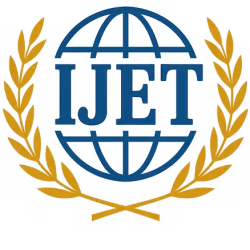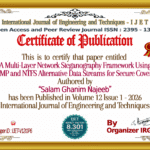
The Analytics of Modern Technical Data Handling Teams – Volume 11 Issue 5

International Journal of Engineering and Techniques
ISSN 2395-1303
Volume 11, Issue 5 | Published: October 2025
Author
Siddhartha Nuthakki , Sonika Koganti
Table of Contents
ToggleAbstract
The role of a Software Engineer Technical Lead (Tech Lead) has become increasingly critical as organizations accelerate digital transformation and adopt emerging technologies. Beyond coding expertise, Tech Leads are expected to combine technical decision-making, architectural guidance, and problem-solving with leadership, mentorship, and cross-functional collaboration. This paper presents a systematic review conducted under PRISMA guidelines, synthesizing findings from four key studies published between 2010 and 2024. The review identifies five major domains of responsibility: (1) technical leadership and architecture decision-making, including technology selection and coding standards; (2) team leadership and mentorship, with an emphasis on guiding junior engineers and cultivating team culture; (3) stakeholder communication and collaboration, bridging technical and non-technical perspectives to align projects with business goals; (4) problem-solving and crisis management, addressing technical challenges and maintaining project continuity; and (5) adaptation to emerging technologies, particularly in areas such as AI and cloud systems. The findings highlight that effective Tech Leads not only safeguard software quality but also drive organizational alignment, foster innovation, and sustain competitive advantage. This guide provides a comprehensive overview of the competencies and expectations defining the Tech Lead role, offering actionable insights for both practitioners and organizations navigating this vital leadership position.
Conclusion
A Software Engineer Technical Lead position entails a broad range of responsibilities that involve technical skills, supervising subordinates, and interpersonal skills. While being responsible for organizing and planning the technical aspects of software projects, Tech Leads should also provide guidance to team members, coordinate an effective team performance, and act as intermediaries between their colleagues and various stakeholders. The role of Tech Lead will only expand with the recent advancements in technologies like AI and ML, and it means constant learning. Tech Leads are responsible for using their coding experience as well as project management skills, which makes them an important factor in software development.
References
1.Nuthakki, S., Kulkarni, C. S., Kathiriya, S., & Nuthakki, Y. (2024). Artificial Intelligence Applications in Natural Gas Industry: A Literature Review. In International Journal of Engineering and Advanced Technology (Vol. 13, Issue 3, pp. 64–70). Blue Eyes Intelligence Engineering and Sciences Engineering and Sciences Publication – BEIESP. https://doi.org/10.35940/ijeat.c4383.13030224. 2.Gichoya JW, Nuthakki S, Maity PG, Purkayastha S. Phronesis of AI in radiology: Superhuman meets natural stupidity [Internet]. arXiv.org. 2018. Available from: https://arxiv.org/abs/1803.11244 3.Nuthakki, S., Bucher, S., & Purkayastha, S. (2019). The development and usability testing of a decision support mobile app for the Essential Care for Every Baby (ECEB) program. In HCI International 2019–Late Breaking Posters: 21st HCI International Conference, HCII 2019, Orlando, FL, USA, July 26–31, 2019, Proceedings 21 (pp. 259-263). Springer International Publishing. 4.Nuthakki, S, “Exploring the Role of Data Science in Healthcare: From Data Collection to Predictive Modeling”, European Journal of Advances in Engineering and Technology, 2020, 7(11):75-79. 5.S. Nuthakki, S. Neela, J. W. Gichoya, and S. Purkayastha, “Natural language processing of MIMICIII clinical notes for identifying diagnosis and procedures with neural networks,” 2019, [Online]. Available: http://arxiv.org/abs/1912.12397 6.R. de Lemos et al., “Software Engineering for Self-Adaptive Systems: A Second Research Roadmap,” Software Engineering for Self-Adaptive Systems II, pp. 1–32, 2013, doi: https://doi.org/10.1007/978-3-642-35813-5_1. 7.S. Amershi et al., “Software Engineering for Machine Learning: A Case Study,” 2019 IEEE/ACM 41st International Conference on Software Engineering: Software Engineering in Practice (ICSE-SEIP), May 2019, doi: https://doi.org/10.1109/icse-seip.2019.00042. 8.Nuthakki, S., Bhogawar, S., Venugopal, S. M., & Mullankandy, S. “Conversational AI AND LLM’S Current And Future Impacts In Improving And Scaling Health Services,” International Journal of Computer Engineering and Technology (IJCET), Vol. 14, no. 3, pp.149-155, Dec. 2023, https://iaeme.com/Home/issue/IJCET?Volume=14&Issue=3 9.Nuthakki, S., Buddiga, SKP., & Koganti, S. Exploring Deep Learning Models for Image Recognition: A Comparative Review. Signal & Image Processing: An International Journal (SIPIJ) Vol.15, No.3, June 2024 DOI: 10.5121/sipij.2024.15301 10.Nuthakki, S., Kolluru, V. K., Nuthakki, Y., & Koganti, S. “Integrating Predictive Analytics and Computational Statistics for Cardiovascular Health Decision-Making”, International Journal Of Innovative Research And Creative Technology, vol. 9, no. 3, pp. 1-12, May 2023, doi: https://doi.org/10.5281/zenodo.11366389 11.Nuthakki, S., Kumar, S., Kulkarni, C. S., & Nuthakki, Y. (2022). “Role of AI Enabled Smart Meters to Enhance Customer Satisfacti2024on”. International Journal of Computer Science and Mobile Computing, Vol.11 Issue.12, December- 2022, pg. 99-107, doi: https://doi.org/10.47760/ijcsmc.2022.v11i12.010. 12.Sai Kalyana Pranitha Buddiga, Siddhartha Nuthakki, “Enhancing Customer Experience through Personalized Recommendations: A Machine Learning Approach”, International Journal of Science and Research (IJSR), Vol.11, Issue.9, September 2022, pp. 1265-1267, dot: https://dx.doi.org/10.21275/SR24531130722. 13.R. Sarkis-Onofre, F. Catalá-López, E. Aromataris, and C. Lockwood, “How to Properly Use the PRISMA Statement,” Systematic Reviews, vol. 10, no. 1, Apr. 2021, doi: https://doi.org/10.1186/s13643-021-01671-z. 14.H. A. Long, D. P. French, and J. M. Brooks, “Optimising the Value of the Critical Appraisal Skills Programme (CASP) Tool for Quality Appraisal in Qualitative Evidence Synthesis,” Research Methods in Medicine & Health Sciences, vol. 1, no. 1, pp. 31–42, 2020, doi: https://doi.org/10.1177/2632084320947559. P. L. Li, A. J. Ko, and J. Zhu, “What Makes a Great Software Engineer?,” 2015 IEEE/ACM 37th IEEE International Conference on Software Engineering, 2015, doi: https://doi.org/10.1109/icse.2015.335.
How to Cite This Article
{{author}}. “{{title}}.” International Journal of Engineering and Techniques (IJET), Volume {{volume}}, Issue {{issue}}, {{pub_date}}. ISSN 2395-1303. Available at: https://ijetjournal.org/
IJET Important Links
© 2025 International Journal of Engineering and Techniques (IJET).

 Current Call for Paper (IJET)
Current Call for Paper (IJET) 



